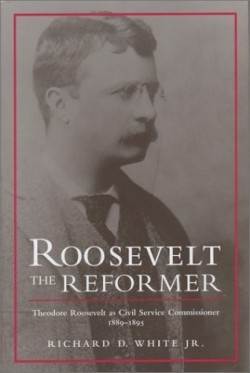Roosevelt the Reformer
Theodore Roosevelt as Civil Service Reformer 1889-1895
During the six years that Theodore Roosevelt served as civil service commissioner (1889?1895), civil service reform was the most divisive issue of its time, says the author, who is an award-winning professor of public administration at Louisiana State University.
Roosevelt belonged to the reform movement that sought to fill civil service jobs based on merit and competitive exams, rather than the politics-as-usual spoils system, in which party hacks doled out jobs in return for votes.
President Benjamin Harrison appointed Roosevelt to the three-member civil service commission because Roosevelt campaigned for him during the 1888 presidential election. Roosevelt’s son once said of his father, “He never likes to go to a wedding or funeral, because he can’t be the bride at a wedding or the corpse at the funeral.” Roosevelt fought boldly, if not brashly, to uphold and expand the 1883 Pendleton Act, which protected civil service workers by outlawing the practice of extorting contributions from workers as a condition for keeping their jobs.
Harrison and his successor, Grover Cleveland, both knew that patronage was necessary to win elections and were not comfortable with Roosevelt’s assault on the spoils system. Democrat Cleveland, however, did not replace him because Roosevelt was equally zealous with Republican and Democratic abusers.
The author, who retired as a captain from the U.S. Coast Guard in 1994, has published articles in numerous scholarly journals, including Public Administration Review and Policy Studies Review. Here, he writes concisely and clearly, but lapses at times into jargon-filled descriptions of civil service rules. He is at his best relating Roosevelt’s civil service battles to the events of his life, and especially good at describing his ongoing feud with Samuel Wanamaker, the Philadelphia magnate who served as Harrison’s Postmaster General. Wanamaker was a reformer in his own right but, unlike Commissioner Roosevelt, understood the importance of patronage for winning elections. This was a lesson that President Roosevelt came to appreciate.
Although Theodore Roosevelt could be impulsive, financially irresponsible, and arrogant, no other modern president, White concludes, was more effective at managing the presidency. While president, Roosevelt approved a pure food and drug act, modernized the Navy, established the Department of Commerce and Labor, and greatly expanded the national parks system. The author makes a strong case that these memorable achievements would not have been possible without the political education or the important alliances that Roosevelt made during his years as civil service commissioner.
Reviewed by
Karl Helicher
Disclosure: This article is not an endorsement, but a review. The publisher of this book provided free copies of the book to have their book reviewed by a professional reviewer. No fee was paid by the publisher for this review. Foreword Reviews only recommends books that we love. Foreword Magazine, Inc. is disclosing this in accordance with the Federal Trade Commission’s 16 CFR, Part 255.

